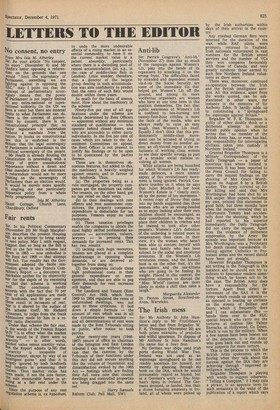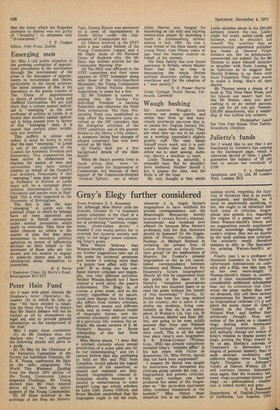The Irish mess
Sir: Mr Anthony St John Hamilton's reply to Mr FitzGibbon's letter and that from Brigadier W. F. K. Thompson (November 20) are both prime examples of prejudice and wilful ignorance. To dispose of Mr Anthony St John Hamilton's (to name but a few) first:
No German war ships used Irish ports during World War Two. Ireland was not used as an espionage springboard as he can readily ascertain for himself, not merely by glancing through my book on the IRA, which he would presumably regard as biased, but at a German's work — Eno Stephan's Spies in Ireland. The Germans dropped, or landed, less than a dozen bungling amateurs in Ireland, all of whom were picked up
by the Irish authorities within days of their arrival in the country.
Any crashed German flers were interned for the duration of the war, while RAF pilots were promptly returned to England. Irish nationals volunteered in vast numbers for the British armed services and the number of VCs they won compares favourably with those of Canada, and very greatly outshone those earned by such few Northern Ireland volunteers as there were.
There was, moreover, continued co-operation between the Irish and the British intelligence services. All this evidence, apart from the works quoted, can be substantiated in other ways, for instance in the memoirs of Sir Anthony Eden. It hardly adds up to constituting a "springboard for espionage against Britain,"
Brigadier W. F. K. Thompson is guilty of either double think or a deliberate attempt to mislead British public opinion when he writes that "no member of the British Army has, or even has had, any responsibility for interrogating civilians taken into custody in Northern Ireland."
Granted Brigadier Thompson is a Military Correspondent of the Daily Telegraph — a paper of notorious bias where Ireland is concerned. It has been reported to the Press Council for failing to carry the inquest findings on the shooting of Mrs Grace Worthington on August 9 by a British soldier. The army covered up for the killing and said that Mrs Worthington had been shot by an IRA sniper. Most papers, including my own, printed this statement in good faith, but three months later when the inquest revealed that an unfortunate Tommy had accidentally done the shooting, which he had reported to his superior immediately, the Daily Telegraph did not carry the inquest. Apart from the evidence of deliberate suppression by the Army the episode was important because as Mrs Worthington was a Protestant her death caused considerable illfeeling against Catholics in Protestant areas and the record should have been set straight.
However Brigadier Thompson is not writing in the Telegraph in this instance and he should not try to indicate to Spectator readers something which he knows not to be the case. The British Army does have a responsibility for the torture. Apart from direct involvement of the SAS it is the Army which rounds up suspects — as opposed to beating up civilians on the streets of Belfast and Derry, which it frequently does and I can substantiate this — hands them over to the RUC special branch who carry out the tortures at centres like Palace Barracks, at Hollywood, Co Down, which is run by the military. When a few names have been beaten out of the detainees, it is the Army who goes back out and rounds up new suspects for more torture.
This is the process to which the British Army spokesmen are referring when they talk about the success against the IRA they are achieving through "improved intelligence methods."
Brigadier Thompson is playing with words to suggest otherwise. " Telling a Compton," if I may coin a phrase, is an apposite term for such semantics in the wake of the publication of a report which says
that the Army which the Brigadier attempts to defend was not guilty of " brutality " to detainees only "ill-treatment."
T. P. Coogan Editor, Irish Press, Dublin











































 Previous page
Previous page